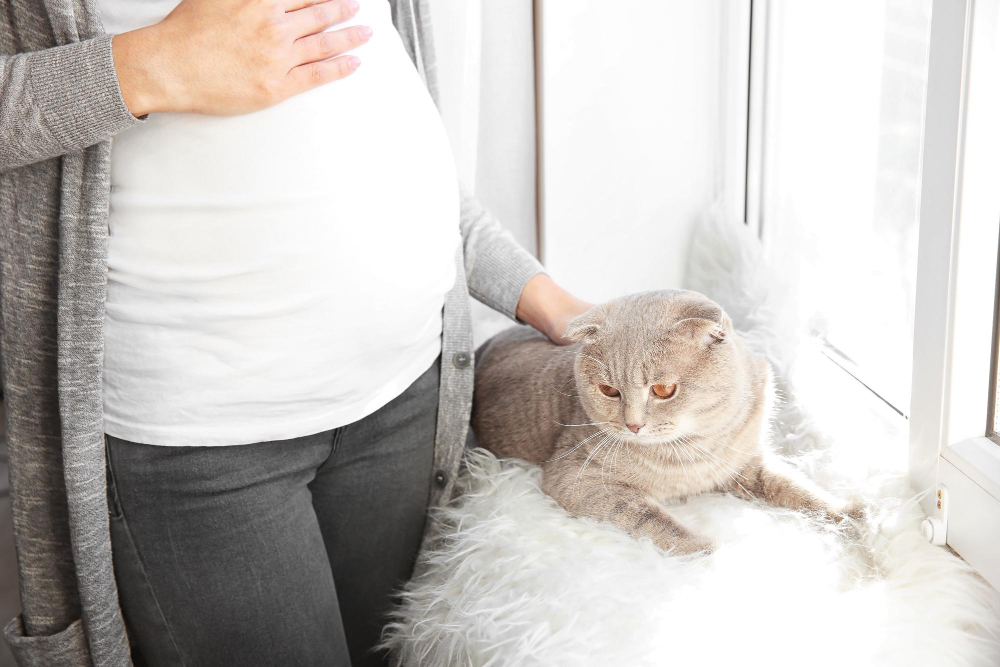Cats have long been known for their keen intuition, often seeming to possess an uncanny ability to detect changes in their environment or the people around them. One area of particular interest is whether cats can sense pregnancy and labor in humans. In this article, we’ll delve into feline intuition, exploring how cats may be able to detect pregnancy, the changes in their behavior, and the unique bond they share with their pregnant owners. We’ll also discuss cat in labor what to do and how to know if your cat is pregnant.
Feline Senses: Can Cats Hear a Baby in the Womb?
Cats possess remarkable hearing abilities that far surpass those of humans. To better understand how cats may be able to hear a baby in the womb, let’s compare feline and human hearing.
While the average human can hear sounds within a frequency range of 20 Hz to 20,000 Hz, cats have a much wider range, detecting frequencies between 48 Hz and 85,000 Hz. This heightened sense of hearing allows cats to pick up on sounds that are inaudible to their human counterparts. Furthermore, cats have the ability to move their ears independently, which helps them pinpoint the source of a sound with great accuracy.
Given these extraordinary hearing capabilities, it’s not surprising that some people believe cats can hear a baby in the womb. Although scientific research in this area is limited, anecdotal evidence suggests that some cats may indeed be able to perceive the faint sounds of a fetus’s heartbeat or movement. This heightened sense of hearing may contribute to a cat’s ability to detect pregnancy, making them more alert and attentive to their pregnant owner.
The Role of Scent: Can Cats Smell Pregnancy?
In addition to their exceptional hearing, cats also have an acute sense of smell, which may play a role in their ability to detect pregnancy. Hormonal changes during pregnancy can affect a woman’s scent, and cats are thought to be sensitive to these changes. It’s possible that these subtle alterations in a woman’s body odor may signal to a cat that their owner is pregnant.
Feline Intuition: How Do Cats Know You’re Pregnant?
One question that many pregnant cat owners ask is, “do cats know when you’re pregnant?” While it’s difficult to pinpoint exactly how cats detect pregnancy, it’s likely that a combination of factors plays a role. As we’ve discussed, cats may be able to hear a baby in the womb or detect changes in a woman’s scent due to hormonal fluctuations. Additionally, cats may pick up on changes in their owner’s behavior or body language, such as increased fatigue or a change in gait.
Cat Behavior: How Will My Cat Act If I’m Pregnant?
Cats can exhibit a range of behavioral changes when their owner is pregnant. Some cats may become more affectionate, while others may be more distant or even act aggressively. Factors that can influence a cat’s behavior during pregnancy include their individual temperament, the strength of the bond with their owner, and the presence of other pets or children in the household.
Feline Pregnancy: How Do I Know If My Cat Is Pregnant?
If you’re a cat owner, you may be curious about “how do I know if my cat’s pregnant?” Some signs of feline pregnancy include an increase in appetite, weight gain, and changes in the appearance of the nipples (they may become larger and more pink). As the pregnancy progresses, you may also notice abdominal swelling. If you suspect your cat may be pregnant, it’s essential to consult a veterinarian for a definitive diagnosis and guidance on proper prenatal care.
Feline Intuition and Labor: Can My Cat Tell If I’m About to Go Into Labor?
There are anecdotal accounts of cats seemingly predicting when their owner is about to go into labor, often becoming more attentive, restless, or vocal. While it’s difficult to confirm these stories scientifically, it’s possible that cats may pick up on subtle changes in their owner’s scent, behavior, or body language that indicate labor is imminent.
Supporting Your Cat During Labor: Cat in Labor – What to Do
If you find yourself in a situation where your cat is in labor, it’s essential to know “cat in labor what to do.” To support your cat during labor, you should:
- Provide a quiet, comfortable space: Set up a nesting area with clean blankets or towels in a secluded spot where your cat can feel safe and secure.
- Keep an eye on the process: Observe your cat from a distance to ensure the labor is progressing smoothly. Typical feline labor includes contractions, straining, and the eventual delivery of kittens and their placentas.
- Know when to intervene: In most cases, cats can give birth without human intervention, as they naturally clean their kittens and sever the umbilical cords by themselves. However, it’s essential to monitor the birthing process to ensure everything is progressing smoothly. If your cat is experiencing prolonged labor, struggles to deliver a kitten, or appears to be in distress, contact your veterinarian immediately for guidance. In some instances, you may need to step in to help with cleaning the kittens or cutting the umbilical cords, but always consult with a veterinarian before taking any action.
- Offer comfort and reassurance: Speak to your cat in a calm, soothing voice to provide reassurance during labor. However, it’s crucial not to disturb your cat too much or interfere with the birthing process.
- Monitor the kittens: Ensure that each kitten is breathing and moving after being born. If a kitten isn’t breathing, you may need to gently rub it with a clean, dry towel to stimulate respiration.
- Contact your veterinarian: Even if the labor appears to go smoothly, it’s essential to schedule a post-birth check-up for both the mother and her kittens to ensure their health and well-being.
Conclusion
In conclusion, the extraordinary senses and intuition of cats, particularly their remarkable hearing abilities and keen sense of smell, may indeed enable them to detect pregnancy and anticipate labor in their human companions. While scientific evidence is limited, anecdotal accounts suggest that cats can perceive changes in their owner’s scent, behavior, and body language that indicate pregnancy or impending labor. Understanding feline intuition and behavior during pregnancy and labor can help strengthen the bond between cats and their pregnant owners, ensuring both human and feline family members receive the necessary support and care during this transformative time. Additionally, being knowledgeable about how to assist your cat during labor, if necessary, can help ensure a smooth and successful birthing process for the feline mother and her kittens.

